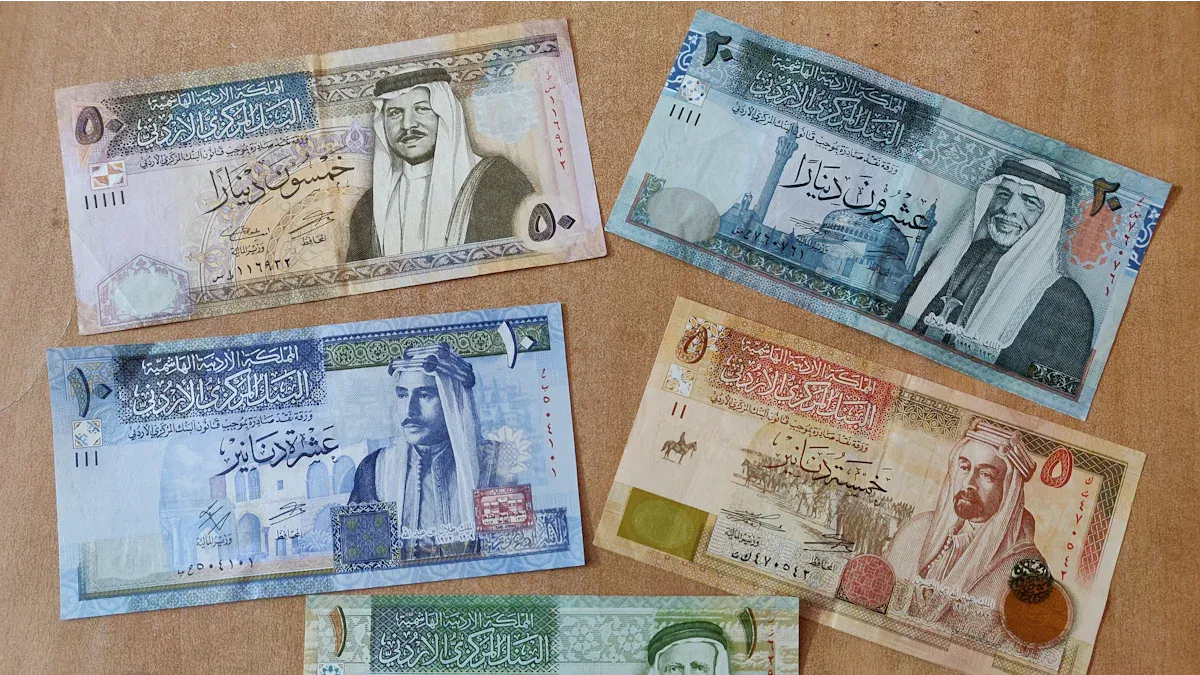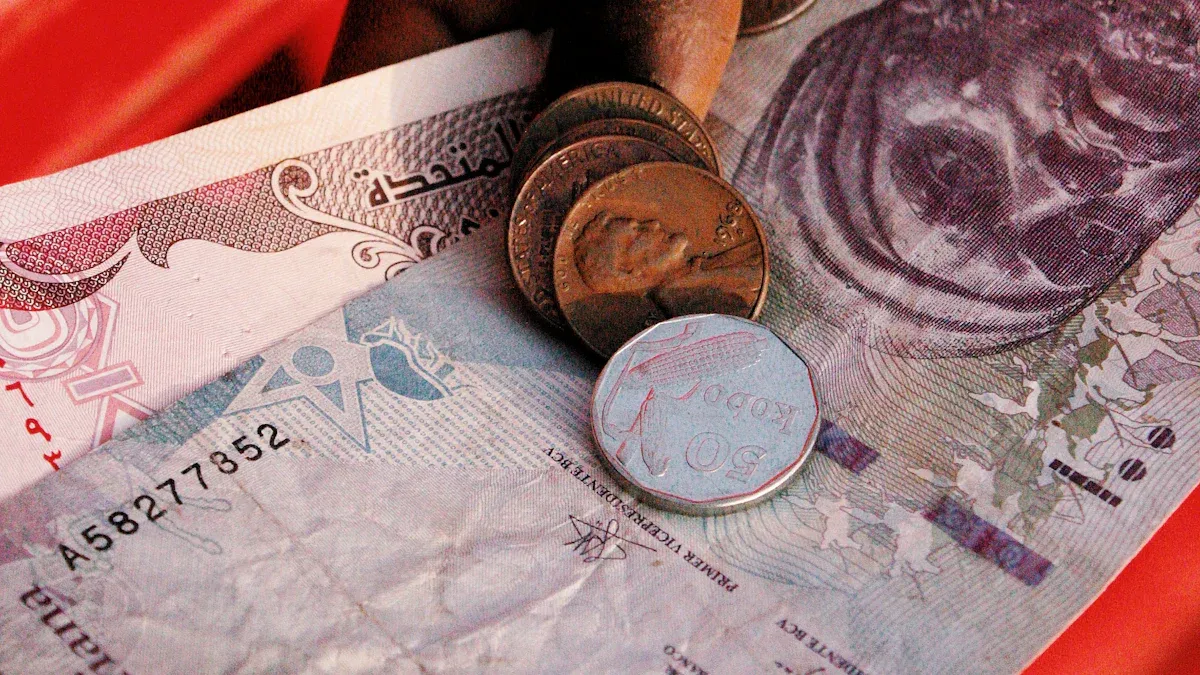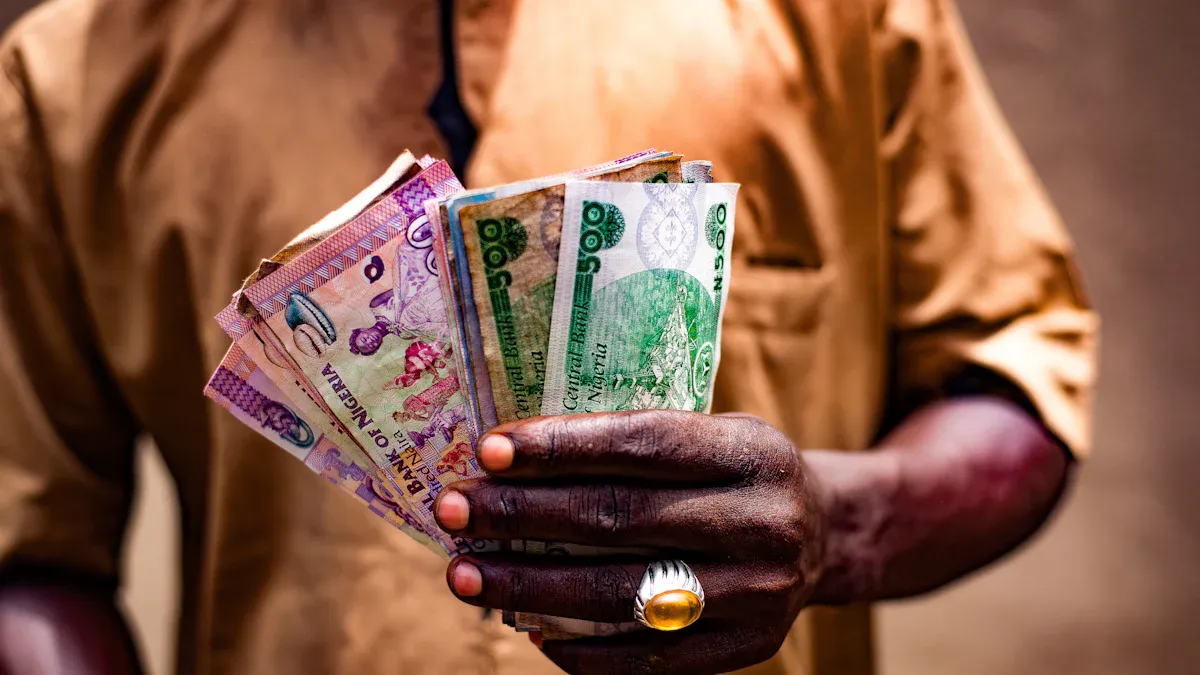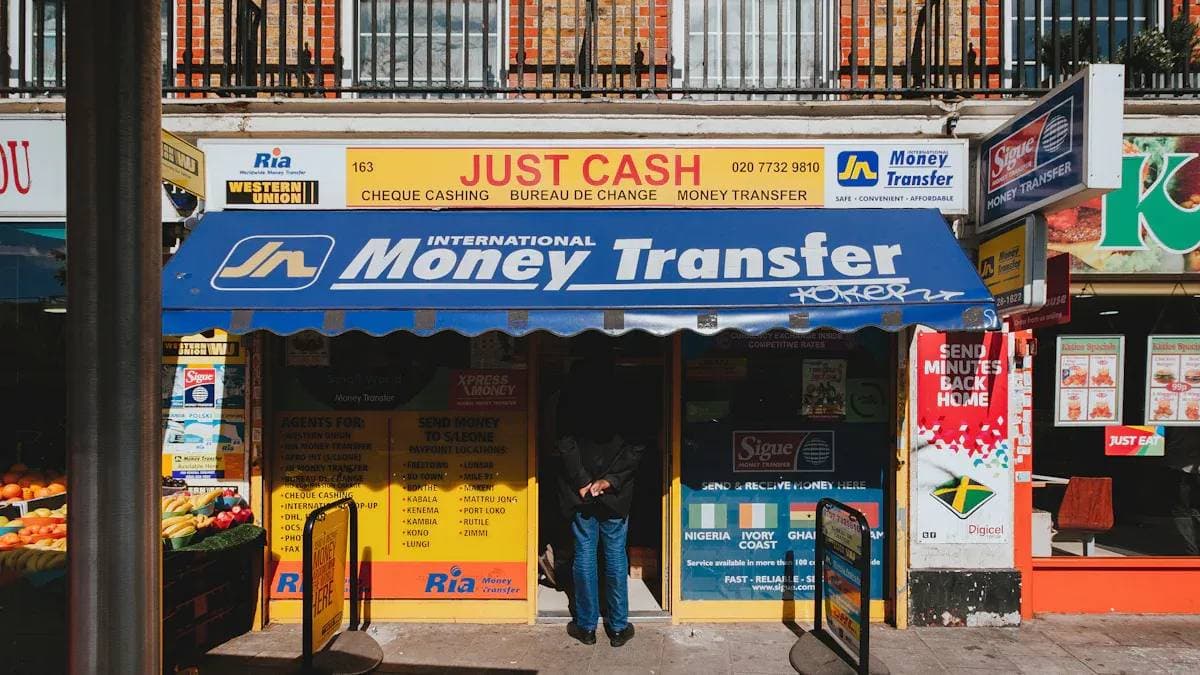- EasyCard
- Trade
- Help
- Announcement
- Academy
- SWIFT Code
- Iban Number
- Referral
- Customer Service
- Blog
- Creator
What Is the Currency of Benin? XOF Exchange, Rates, and Remittance Guide

Image Source: pexels
Benin’s currency is the West African CFA Franc, with the international code XOF. Understanding its currency information is crucial when planning a trip to Benin. Benin’s economic activity is increasingly vibrant. For example, in 2019, the country attracted 337,000 international visitors. Meanwhile, trade with China is also highly significant.
Overview of China-Benin Trade (2017-2021 Average)
Trade Flow Amount (Million USD) Benin Imports from China 544 Benin Exports to China 55
This guide will help you master the core knowledge about XOF.
Key Points
- Benin uses the West African CFA Franc (XOF), which is pegged to the euro at a fixed rate, ensuring currency value stability.
- When exchanging currency, choose banks or official exchange points, avoid street transactions, and prioritize euros or dollars.
- When sending remittances to Benin, online remittance services are generally more cost-effective and faster than traditional banks.
- Before sending a remittance, carefully verify recipient information and stay vigilant against financial scams to protect your funds.
Benin’s Currency: West African CFA Franc (XOF) Explained

Image Source: pexels
To deeply understand Benin’s currency, you first need to know its full name and background. The “CFA” in West African CFA Franc stands for “Communauté Financière Africaine” (African Financial Community). It is exclusively issued and managed by the Central Bank of West African States (BCEAO), headquartered in Dakar, Senegal. The West African CFA Franc was established in 1945, replacing the former French West African Franc, and its history reflects multiple changes in member states.
Basic Information About XOF
The West African CFA Franc (XOF) is the official currency of eight member states of the West African Economic and Monetary Union (UEMOA). This union aims to promote economic integration and financial stability in the region. All XOF banknotes are printed by the Bank of France at its facility in Chamalières, ensuring high manufacturing quality and anti-counterfeiting measures.
Currency Symbol and Denominations
In Benin, you will encounter various denominations of the West African CFA Franc.
- Banknote Denominations: 500, 1000, 2000, 5000, 10000 XOF
- Coin Denominations: 1, 5, 10, 25, 50, 100, 200, 250, 500 XOF
To help you identify genuine notes, the latest XOF banknotes include multiple anti-counterfeiting features.
Tip for Identifying Genuine Notes You can hold the note up to a light source to check for a watermark with a sawfish pattern. Additionally, feel the denomination number and bank logo on the front; you should notice a distinct raised texture. The 5000 CFA Franc note also features a holographic diffraction pattern, increasing the difficulty of counterfeiting.
Countries Using XOF
Benin’s currency is not limited to its borders. As a member of the West African Economic and Monetary Union (UEMOA), Benin shares XOF with seven other countries.
A critical point to understand is that while the West African CFA Franc (XOF) and the Central African CFA Franc (XAF) have equal value, they cannot be used interchangeably in each other’s regions.
| Feature | West African CFA Franc (XOF) | Central African CFA Franc (XAF) |
|---|---|---|
| Issuing Authority | Central Bank of West African States (BCEAO) | Bank of Central African States (BEAC) |
| Using Countries | Benin, Burkina Faso, Côte d’Ivoire, and 5 others | Cameroon, Chad, Gabon, and 3 others |
| Interchangeability | Not interchangeable with XAF | Not interchangeable with XOF |
This means that XOF francs exchanged in Benin cannot be used in Central African countries like Cameroon, and vice versa.
XOF Exchange Rates and Currency Conversion
When planning a trip to Benin or sending international remittances, understanding exchange rates is a critical step. Exchange rates determine how much West African CFA Franc you can get with your home currency. This section will detail the XOF exchange rate mechanism and provide practical currency conversion advice.
Understanding the Mid-Market Exchange Rate
When checking exchange rates, the first concept you’ll encounter is the “mid-market exchange rate.” Simply put, this is the exchange rate used in interbank currency transactions. You can think of it as the midpoint between the buy and sell prices of a currency, representing the fairest and most accurate value, free of any additional fees or profits. This rate is determined by global forex market supply and demand, so it fluctuates in real time.
However, the exchange rate you actually receive at banks or exchange points typically differs from the mid-market rate. Why is that?
Why Do Consumer Rates Differ? Banks and currency exchange services add a “spread” or “markup” to the mid-market rate when providing services. This spread is not a separate fee but is built directly into the “retail exchange rate” you receive. Providers do this for three main reasons:
- Cover Costs: To pay operational expenses, such as staff salaries and rent.
- Generate Profit: To earn revenue from currency exchange services.
- Mitigate Risk: To hedge against potential losses from currency value fluctuations.
Therefore, before exchanging currency, you must compare the final exchange rates offered by different providers.
XOF’s Fixed Exchange Rate with the Euro
One of the most significant features of the West African CFA Franc (XOF) is its fixed exchange rate with the euro (EUR). This policy, guaranteed by the French Treasury, provides significant stability to Benin’s currency. Regardless of international market fluctuations, the exchange rate between XOF and EUR remains constant.
| Currency | Fixed Exchange Rate |
|---|---|
| 1 Euro (EUR) | 655.957 West African CFA Franc (XOF) |
This fixed rate means that if you bring euros to Benin for exchange, the rate is certain, and you don’t need to worry about exchange rate losses.
XOF Exchange Rates with Major Currencies
Since XOF is pegged to the euro, its exchange rates with other major currencies (e.g., USD or CNY) are floating. These rates fluctuate with changes in the euro’s value against these currencies.
To check the latest rates, you can use reliable online currency conversion tools. For example, Xe.com provides real-time mid-market exchange rates, giving you the most accurate current currency values.
Below are approximate exchange rates for the West African CFA Franc against CNY and USD; note that these figures change in real time:
XOF to Chinese Yuan (CNY) Based on current rates, 1 XOF is approximately 0.01259 CNY.
| XOF | CNY |
|---|---|
| 100 | 1.26 |
| 500 | 6.30 |
| 1000 | 12.59 |
| 5000 | 62.97 |
| 10000 | 125.94 |
XOF to US Dollar (USD) Based on current rates, 1 XOF is approximately 0.0018 USD.
| XOF | USD |
|---|---|
| 100 | 0.18 |
| 500 | 0.88 |
| 1000 | 1.77 |
| 5000 | 8.84 |
| 10000 | 17.68 |
How to Exchange Currency in Benin
When you arrive in Benin, you’ll need to exchange foreign currency for the local XOF. Here are some safe and practical tips:
- Choose Legitimate Channels: Always exchange at banks or officially authorized exchange offices (
Bureau de Change). These are regulated by the government, ensuring you receive genuine notes and fair rates. - Bring Euros or Dollars: Since XOF is pegged to the euro, bringing euros is usually the most convenient. US dollars are also widely accepted as a hard currency.
- Avoid Black Market Transactions: Never exchange currency with strangers on the street or through unofficial channels. Not only are the rates unfavorable, but you also risk receiving counterfeit notes or falling victim to scams, leading to financial losses.
- Ask About Fees Upfront: Before confirming an exchange, always clarify the final amount you’ll receive. Some exchange points may charge additional handling fees, which can affect your actual proceeds.
- Keep Exchange Receipts: Save your receipts after exchanging. You may need them to convert remaining XOF back to foreign currency when leaving Benin.
Following these tips ensures you can safely and smoothly complete currency exchanges in Benin.
Guide to Sending Remittances to Benin

Image Source: pexels
If you need to send money to family, friends, or business partners in Benin, modern online remittance services offer faster and more cost-effective options than traditional banks. This guide will walk you through the process, ensuring your funds reach their destination safely and efficiently.
Choosing a Reliable Remittance Service
Selecting a trustworthy remittance platform is the first step to ensuring your funds’ safety. Compared to traditional banks, professional online remittance companies typically offer better exchange rates and lower fees.
When comparing services, focus on the following points:
- Exchange Rate: Some providers (e.g., Wise) are known for using the mid-market exchange rate, meaning you get the fairest rate. Others may include a markup in the rate.
- Fee Transparency: Look for platforms like Remitly that promise no hidden fees. You should know all costs upfront before sending.
- Security and Compliance: Ensure the provider is a licensed company regulated by financial authorities. This maximizes your funds’ safety.
- Receipt Methods: Confirm whether the provider supports your preferred receipt method, such as bank account deposits, mobile wallet receipts, or cash pickups.
Steps for Online Remittance
Most online remittance platforms follow a similar, user-friendly process. Typically, you just need to complete the following simple steps:
- Create an Account: Sign up for a free account on the website or app of your chosen remittance platform.
- Set Up the Transfer: Enter the amount you wish to send and the currency the recipient will receive (XOF). The system will automatically display the exchange rate, fees, and estimated delivery amount.
- Enter Recipient Information: This is a critical step. You need to accurately provide the recipient’s details. The required information varies depending on the receipt method.
Recipient Information Checklist
- General Information:
- Recipient’s full name (matching their ID)
- Recipient’s address
- Recipient’s phone number
- Bank Account Transfer Requirements:
- Recipient’s bank account number
- Bank branch name
- Purpose of transfer
- Mobile Wallet Transfer Requirements:
- Recipient’s mobile wallet account (usually a phone number)
- Pay for the Transfer: Choose a payment method to fund your transfer, such as using a debit card, credit card, or direct bank account transfer.
- Confirm and Send: In the final step, carefully review all information, including the amount and recipient details. Once confirmed, submit the transfer. You can then track the transfer status through the platform.
Remittance Fees and Delivery Times
Fees and speed are the two most important factors when choosing a remittance service.
Remittance Fees Fees typically consist of a fixed handling fee and an exchange rate margin. Some platforms offer zero-fee services under specific conditions. Below is an example of fees for sending $500 from the US to Benin, noting that fees may adjust with market changes.
| Remittance Platform | Fee (USD) |
|---|---|
| XE | $0 |
| Western Union | $2.99 |
| Wise | $3.88 |
| TorFX | $0 |
Delivery Time Mobile wallets are typically the fastest way to send money to Benin, often arriving instantly. Bank transfers may take longer.
| Transfer Method | Delivery Time |
|---|---|
| Bank Account | Instant to 3 business days |
| Mobile Wallet | Instant (up to 5 minutes) |
When prioritizing speed and convenience, mobile wallets are clearly superior to traditional bank transfers.
Transfer Limits Note that most remittance services and receiving countries impose transfer limits. For example, some providers may have a daily maximum transaction limit of $2,000. Additionally, the recipient’s mobile wallet account may have its own receiving limits. Exceeding these limits may cause the transaction to fail. Before sending large amounts, confirm the restrictions with the provider.
Remittance Safety Tips
While online remittances are highly convenient, you must remain vigilant against potential financial scams. Many scams targeting international remittances are linked to West Africa, so you need to be particularly cautious.
Golden Rule If something sounds too good to be true, it probably is. Stay highly skeptical of any requests promising easy money or requiring upfront payments.
Here are some common scam types and how to protect yourself:
- Advance-Fee Fraud
- Scam Form: Scammers claim you’ve won a lottery, inherited money, or have a lucrative business opportunity but require you to pay a “handling fee,” “tax,” or “administrative fee” to unlock the funds. Once you pay, they disappear.
- How to Avoid: Legitimate companies or institutions will not require upfront fees to release funds. Ignore such requests outright.
- Impersonation and Phishing Websites
- Scam Form: Scammers pose as customer service representatives from remittance companies, contacting you via phone or email to request your account password or payment details under the guise of “resolving an issue.” They may also create fake websites mimicking official ones to steal your login information.
- How to Avoid: Never share sensitive personal information via phone or email. If you receive a call claiming to be from customer service, hang up and contact the company directly through official channels. Before entering information, ensure the browser address bar starts with
https://for a secure link.
- Money Muling Scam
- Scam Form: Scammers may ask you to receive funds into your account and transfer them elsewhere, promising a “commission.” This may seem like easy money, but you could unknowingly be helping criminals launder money.
- How to Avoid: Never agree to receive or transfer funds for someone you don’t know. You risk not only losing money but also facing serious legal consequences.
By choosing legitimate, licensed remittance services and staying vigilant against scams, you can safely and confidently send funds to Benin.
Now you understand the core information about Benin’s currency. Remember these key points: Benin uses the West African CFA Franc (XOF), pegged to the euro, and choosing regulated platforms like Remitly or Wise that use mid-market exchange rates can save you money.
Personal remittances are vital to Benin’s economy, totaling over $233 million in 2023, accounting for about 1.1% of its GDP.
Important Reminder: Always use regulated official channels for all currency exchanges and remittances to ensure your funds’ safety and compliance with local regulations.
Wishing you smooth travels, business, or family connections in Benin!
FAQ
Can I Use a Bank Card in Benin?
In Benin, particularly in major cities like Cotonou, you can use international credit cards (e.g., Visa or Mastercard) at large hotels, supermarkets, and some restaurants. However, many small shops and markets accept only cash.
Travel Tip ATMs are not widely available. It’s best to carry sufficient cash for daily expenses and not rely solely on card payments.
How Much Cash Should I Bring to Benin?
The amount of cash to bring depends on your travel plans and spending habits. It’s recommended to carry enough cash to cover the first few days of accommodation and transportation. Dollars or euros are the best choices, as they are easier to exchange locally.
- Short-Term Travel: Consider carrying a few hundred dollars in cash as a backup.
- Safety Tip: Distribute cash in different locations to prevent loss or theft.
Can I Directly Exchange Chinese Yuan for West African CFA Franc?
In Benin, it’s difficult to find places that directly exchange Chinese Yuan (CNY) for West African CFA Franc (XOF). Banks and official exchange points primarily accept international currencies like US dollars (USD) and euros (EUR).
What If My Remittance to Benin Fails?
If your remittance fails, contact the remittance service provider immediately. They will help investigate the reason. Common causes include incorrect recipient information or exceeding transfer limits.
- Verify Information: Before initiating a transfer, carefully check the recipient’s name and account details.
- Contact Customer Service: Keep your transaction records and provide detailed information to customer support.
*This article is provided for general information purposes and does not constitute legal, tax or other professional advice from BiyaPay or its subsidiaries and its affiliates, and it is not intended as a substitute for obtaining advice from a financial advisor or any other professional.
We make no representations, warranties or warranties, express or implied, as to the accuracy, completeness or timeliness of the contents of this publication.




Contact Us
Company and Team
BiyaPay Products
Customer Services
is a broker-dealer registered with the U.S. Securities and Exchange Commission (SEC) (No.: 802-127417), member of the Financial Industry Regulatory Authority (FINRA) (CRD: 325027), member of the Securities Investor Protection Corporation (SIPC), and regulated by FINRA and SEC.
registered with the US Financial Crimes Enforcement Network (FinCEN), as a Money Services Business (MSB), registration number: 31000218637349, and regulated by FinCEN.
registered as Financial Service Provider (FSP number: FSP1007221) in New Zealand, and is a member of the Financial Dispute Resolution Scheme, a New Zealand independent dispute resolution service provider.



















